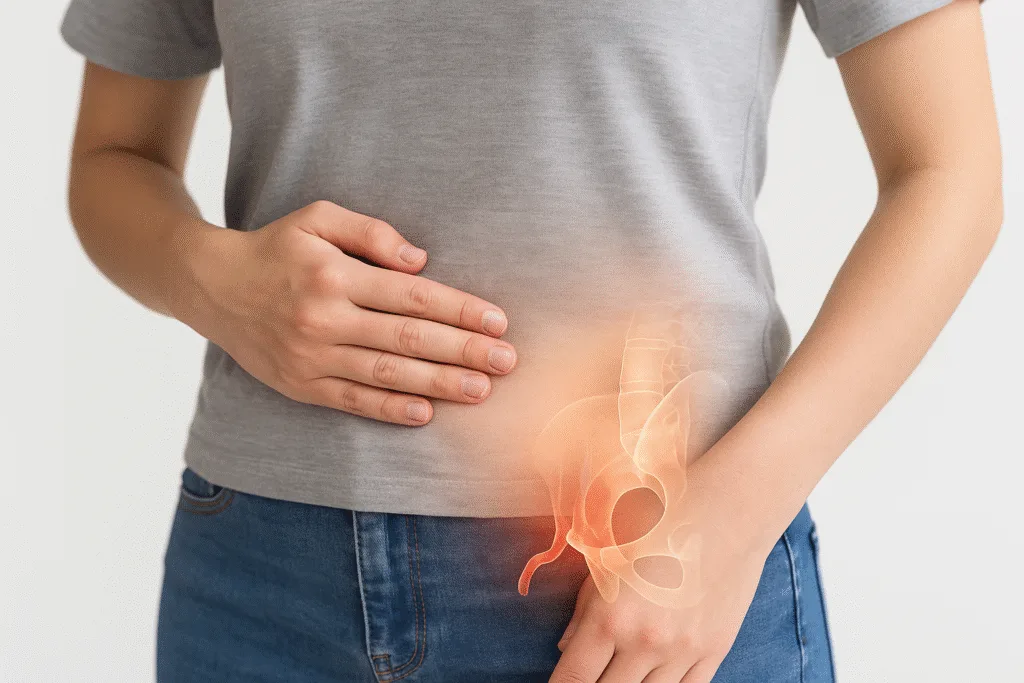The appendix immune activation test explores how this small organ, long considered useless, still plays an important role in your immune system. Early humans relied on the appendix to help digest tough plant materials. As diet and digestive efficiency evolved, this organ lost its original purpose — but it remained in the body, slowly shifting into a new function.
Today, scientists understand that the appendix acts as a safe reservoir for beneficial bacteria and helps regulate immune responses in the gut. This experiment allows you to explore how your appendix still influences your internal biology, even though it is no longer essential for digestion.
Below is the complete appendix immune activation test.
Step 1 — Sit or Stand in a Neutral, Relaxed Posture
Place one hand gently on your lower right abdomen.
This is the general region of the appendix.
Why this matters
Awareness of the area helps you understand internal sensations during the appendix immune activation test.
Step 2 — Breathe Deeply and Observe the Abdominal Expansion
Take slow, deep breaths.
Feel how your lower abdomen expands and contracts.
Why
This helps identify natural movement and differentiate between normal sensations and pressure in the appendix region.
Step 3 — Evaluate Your Recent Digestive Comfort
Ask yourself whether you’ve experienced:
- bloating
- irregular bowel movements
- mild cramping
- digestive ease
Why
Gut immune activity is closely linked to appendix function.
Step 4 — Pay Attention to Stress Levels and How They Affect Your Gut
Reflect on whether stress has recently altered:
- appetite
- digestion
- abdominal tension
What happens
The appendix interacts with immune responses that change under stress.

Step 5 — Observe Gut Responses After Eating Fiber-Rich Foods
Notice how your body reacts to foods like:
- fruits
- vegetables
- whole grains
- legumes
Why
Beneficial bacteria thrive on fiber — and these bacteria use the appendix as a reservoir.
Step 6 — Notice Any Changes After Mild Physical Activity
Walk for a few minutes or stretch lightly.
What happens
Movement increases blood flow to gut tissues, including the appendix area.
Why
This helps reveal how the gut responds to motion and circulation changes.
Step 7 — Track Your Immune Sensitivity
Consider:
- how often you get colds
- how quickly you recover
- whether gut discomfort accompanies illness
Why
Appendix-related bacteria help stabilize immune responses.
Step 8 — Observe Reactions After Probiotic Foods
Pay attention to how you feel after consuming:
- yogurt
- kefir
- fermented foods
What happens
These foods feed beneficial bacteria — the same bacteria supported by the appendix.
Step 9 — Compare Days of High Stress and Low Stress
Analyze whether:
- your digestion worsens under stress
- certain foods cause different reactions
- your immune resilience changes
Why
Gut–brain interactions affect immune activation, part of what the appendix influences.
Step 10 — What This Evolutionary Structure Reveals About You
The appendix immune activation test highlights how evolution repurposed this organ:
1. The appendix once aided digestion
Early humans used it to break down tough plant material.
2. It gradually lost its primary function
Changes in diet made the organ less essential.
3. It now supports immune stability
The appendix houses beneficial bacteria used during gut recovery.
4. It acts as a biological backup
After infections or antibiotics, the appendix helps repopulate the microbiome.
5. It influences symptoms during stress
Immune-related gut responses can be affected by appendix function.
6. It shows evolution repurposes structures
The organ adapted rather than disappearing entirely.
7. It reveals your connection to ancient digestive anatomy
Your appendix remains a small but meaningful part of evolutionary history.
The appendix immune activation test demonstrates that even so-called “useless” organs can hold valuable biological roles today.
Next Evolution Experiment You Should Try
If the appendix immune activation test revealed how your appendix supports immunity, the next experiment explores another evolutionary structure hidden in your anatomy.
Recommended next article:
“The Body Hair Sensitivity Test — Why This Ancient Feature Still Responds Today”

Dr. Ethan Marlowe is a science communicator specializing in human biology, neuroscience, and the hidden mechanisms of the body. He focuses on transforming complex research into clear, engaging explanations that help readers understand how their bodies work. At The Human Body Facts, Ethan brings curiosity, accuracy, and a modern scientific approach to every article.